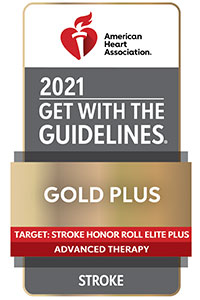An Advanced Primary Stroke Center in Birmingham
Many times they come without warning. Suddenly, someone is having a stroke. It’s in this moment that time is of the essence. And tending to the patient immediately is crucial to saving their life. In addition, it’s super important that expert
physicians, stroke specialists and neurosurgeons are the ones to provide that care. That’s why the stroke team at Brookwood Baptist Medical Center is prepared 24 hours, seven days a week to treat urgent medical emergencies like strokes.
Offering 24/7 Neurology Coverage and More
The reason why expert care is so important for stroke patients is because the treatment is so specialized. But our stroke team is well equipped with the services to treat stoke symptoms, including:
- Access to clot-busting drugs like tPA and other medical procedures
- Interventional neurology
- A dedicated, specialized care team to support patients throughout all aspects of stroke treatment
- Diagnosis and treatment plans based on national guidelines for stroke care
- Physical therapy
- Stroke education for patients and families
 Recognize the Symptoms of a Stroke with BE FAST
Recognize the Symptoms of a Stroke with BE FAST
Seconds count when suffering a stroke. Getting a patient to a hospital quickly for treatment can drastically increase their chance of recovery. To recognize the symptoms of a stroke, remember BE FAST. Reacting quickly can save a brain, or a life.
Balance. Is there dizziness or lack of coordination?
Eyes. Does the stroke sufferer have blurry or double vision? Or is there a loss of vision in one eye?
Face. Can the person smile? Is there drooping on one side of the face?
Arm. Does the person have weakness or numbness in one arm? Ask them to raise both arms. Does one arm drift downward?
Speech. Does the person have slurred or strange speech? Ask them to repeat a simple sentence. Do they do it correctly?
Time. Time is of the essence! If anybody shows any of these symptoms, call 9-1-1 immediately.
Treatment for a stroke begins with recognizing symptoms, calling 9-1-1 and receiving emergency care. The goal for stroke sufferers is to regain function and return to daily life. Brookwood Baptist Medical Center provides ongoing care to help you return
to being you, sooner.
A Certified Primary Stroke Center Close to Home
Designated a Certified Advanced Primary Stroke Center hospital by the Joint Commission, Brookwood Baptist Medical Center stroke specialists are prepared 24 hours a day, seven days a week to treat urgent stroke conditions. With a dedicated team of doctors
and staff, our stroke-focused program provides the highest level of care to stroke patients.
The Difference Between Ischemic and Hemorrhagic Strokes
While there are several differences, put simply, an ischemic stroke is when an artery that supplies blood to the brain becomes blocked. A hemorrhagic stroke happens when a blood vessel ruptures in the brain, putting pressure on the brain tissue and limiting
its use of oxygen.
An ischemic stroke can be treated several ways, while a hemorrhagic stroke can be treated using a variety of non-surgical and surgical methods.
Ischemic Stroke Treatment Options for You
While there are a wide range of stroke treatments available, your specific treatment depends on the type of stroke and doctor’s judgement based on the patient’s needs.
Treatment options for an ischemic stroke include:
- A mechanical thrombectomy is a procedure in which a catheter is inserted into a vein to remove the blockage in the brain.
- tPA is a clot-busting drug that saves lives and reduces the long-term effects of a stroke. tPA should be administered within 90 minutes from the beginning of the stroke, so it’s crucial to act fast.
Hemorrhagic Stroke Treatment Options for You
A hemorrhagic stroke can be just as devastating as an ischemic stroke, and just as important, it’s vitally critical to act fast.
Here are a few non-surgical methods for treating a hemorrhagic stroke:
- Control your blood pressure
- Stop using any medications that might increase bleeding, such as warfarin or aspirin
- Get a blood transfusion with clotting factors to help stop ongoing bleeding
Now, a few surgical methods for treating a hemorrhagic stroke:
- For an endovascular treatment, the surgeon inserts a long tube into a blood vessel in the arm or leg. This tube travels to the brain, where a coil or clip is used to prevent further bleeding.
- An aneurysm is treated by removing part of the skull to find the aneurysm, the weakened and ruptured section of the blood vessel. A clamp is used to stop the bleeding.
- For life-threatening situations, a decompressive craniotomy is performed. The skull is opened to remove blood and release pressure on the brain.
At Brookwood Baptist Medical Center’s Primary Stroke Center, you’ll find stroke specialists with the expertise to quickly make a diagnosis and intervene with the best methods possible for treating the patient’s condition.
BBMC’s Additional Stroke Care Awards & Recognitions
In addition to being an Advanced Certified Primary Stroke Center, BBMC has also been recognized with the following distinctions:
- Get with the Guidelines: Gold Plus, Target Stroke Honor Roll Elite Plus, Target Stroke Advanced Therapy Honor Roll
- Get with the Guidelines Stroke Gold Plus Quality Achievement Award
- Get with the Guidelines Target: Stroke Honor Roll Elite Plus Achievement Award
- American Heart Association / American Stroke Association Recognition for Excellence in Stroke Care